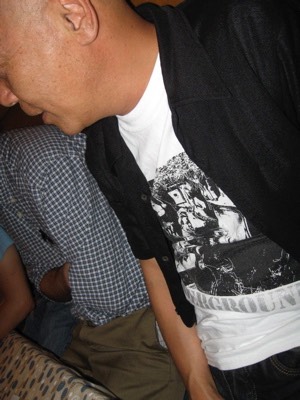Sorry for the lack of posts. The summer class was frankly one of the toughest classes I have taught, not because of the students--who were great--but because of the time involved. My last post was written during the last week of class, after which I had grading, a trip to Hokkaido, cleaning up and packing, and the plane back to the States. Now I am back in Connecticut.
But my class was graced with some nice guests in the last few days. The first one was the director Hiroki Ryuichi. I've known Hiroki-san for some years, since when I first met him at the Tokyo Film Festival after a screening of I Am an SM Writer (he kindly said he had read my review of Night Without Angels). I had more opportunities to talk with him when we were both invited to the Dejima Film Festival and later to Nippon Connection. It was he who kindly gave me a birthday cake during a Q and A session after one of his films at Dejima and joked about making a movie called "Tokyo Ramen Baby" about a traveling ramen stand in Europe with me in a side role as a crazy customer. Hiroki-san is a nice guy, though we somewhat live in different worlds.
This was Hiroki-san's first visit to one of my classes and we showed Vibrator and had a great discussion afterwards. It was the first time many of my students had met a director and talked to him about a film he had made and some were quite inquisitive. What I am glad got out was the degree to which Hiroki-san refrains from explanation in his films, preferring long takes to cut-ins and close-ups. He even related a time in Sundance when Robert Redford noted that of his work and Hiroki-san took that as confirmation that his way of making films was OK. I've always thought about Hiroki-san in the same line as Matsuoka Joji as a director who uses what I call the "detached style" more from his guts, or from a both intuitive and professional sense of what cinema is, than from an intellectual stance like Aoyama Shinji or even Kurosawa Kiyoshi. And unlike Kitano, who can also think from the gut, Hiroki-san and Matsuoka-san do this without foregrounding an auteur style, presenting instead their long take, long shots as the accumulated knowledge of a craftsman.
We went out drinking afterwards (I have to apologize to Hiroki-san about the choice of restaurants), and "Hiroki-san-rashiku" he brought a young actress with him.
I saw Hiroki-san's Kimi no tomodachi after his visit to class and I was quite impressed. In this day, when there are still tons of Japanese tear-jerkers out there where one side of a couple dies, this was one film without cheaply obtained tears. Again using long-shot, long takes for much of the film, Hiroki-san makes us work hard to get close to the characters. When something sad happens, we thus cry (and I cried a lot!), not because we have been manipulated to cry, but because we have made that effort to try to learn about these people.
Here's a shot of Hiroki-san's tasteful t-shirt.


